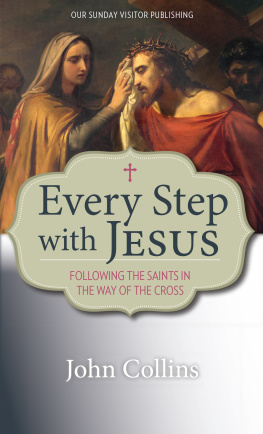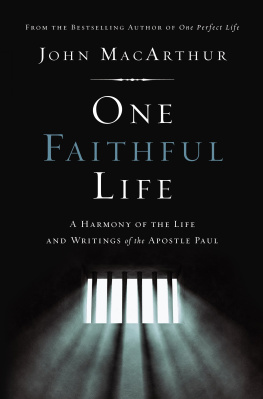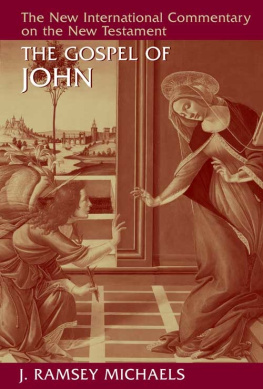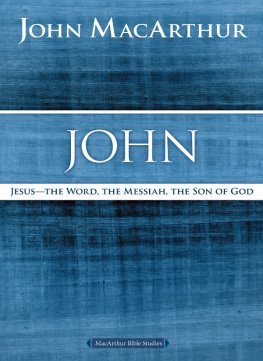Michaels - John
Here you can read online Michaels - John full text of the book (entire story) in english for free. Download pdf and epub, get meaning, cover and reviews about this ebook. City: Grand Rapids;MI, year: 2011;1989, publisher: Baker Publishing Group, genre: Religion. Description of the work, (preface) as well as reviews are available. Best literature library LitArk.com created for fans of good reading and offers a wide selection of genres:
Romance novel
Science fiction
Adventure
Detective
Science
History
Home and family
Prose
Art
Politics
Computer
Non-fiction
Religion
Business
Children
Humor
Choose a favorite category and find really read worthwhile books. Enjoy immersion in the world of imagination, feel the emotions of the characters or learn something new for yourself, make an fascinating discovery.

John: summary, description and annotation
We offer to read an annotation, description, summary or preface (depends on what the author of the book "John" wrote himself). If you haven't found the necessary information about the book — write in the comments, we will try to find it.
Michaels: author's other books
Who wrote John? Find out the surname, the name of the author of the book and a list of all author's works by series.
John — read online for free the complete book (whole text) full work
Below is the text of the book, divided by pages. System saving the place of the last page read, allows you to conveniently read the book "John" online for free, without having to search again every time where you left off. Put a bookmark, and you can go to the page where you finished reading at any time.
Font size:
Interval:
Bookmark:
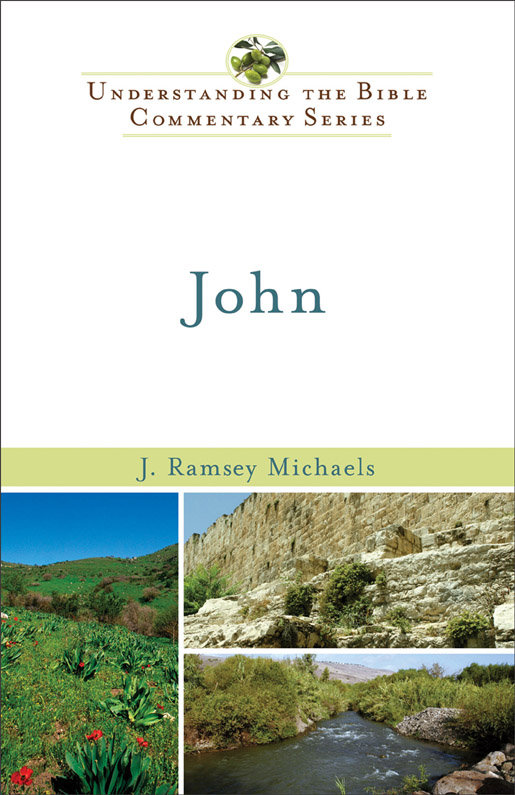

U NDERSTANDING THE B IBLE
C OMMENTARY S ERIES
G ENERAL E DITORS
W. Ward Gasque
Robert L. Hubbard Jr.
Robert K. Johnston
John
J. Ramsey Michaels

a division of Baker Publishing Group
Grand Rapids, Michigan
Table of Contents
Although it does not appear on the standard best-seller lists, the Bible continues to outsell all other books. And in spite of growing secularism in the West, there are no signs that interest in its message is abating. Quite to the contrary, more and more men and women are turning to its pages for insight and guidance in the midst of the ever-increasing complexity of modern life.
This renewed interest in Scripture is found both outside and inside the church. It is found among people in Asia and Africa as well as in Europe and North America; indeed, as one moves outside of the traditionally Christian countries, interest in the Bible seems to quicken. Believers associated with the traditional Catholic and Protestant churches manifest the same eagerness for the Word that is found in the newer evangelical churches and fellowships.
We wish to encourage and, indeed, strengthen this worldwide movement of lay Bible study by offering this new commentary series. Although we hope that pastors and teachers will find these volumes helpful in both understanding and communicating the Word of God, we do not write primarily for them. Our aim is to provide for the benefit of every Bible reader reliable guides to the books of the Biblerepresenting the best of contemporary scholarship presented in a form that does not require formal theological education to understand.
The conviction of editor and authors alike is that the Bible belongs to the people and not merely to the academy. The message of the Bible is too important to be locked up in erudite and esoteric essays and monographs written only for the eyes of theological specialists. Although exact scholarship has its place in the service of Christ, those who share in the teaching office of the church have a responsibility to make the results of their research accessible to the Christian community at large. Thus, the Bible scholars who join in the presentation of this series write with these broader concerns in view.
A wide range of modern translations is available to the contemporary Bible student. Most of them are very good and much to be preferredfor understanding, if not always for beautyto the older King James Version (the so-called Authorized Version of the Bible). The Revised Standard Version has become the standard English translation in many seminaries and colleges and represents the best of modern Protestant scholarship. It is also available in a slightly altered common Bible edition with the Catholic imprimatur, and a third revised edition is due out shortly. In addition, the New American Bible is a fresh translation that represents the best of postVatican II Roman Catholic biblical scholarship and is in a more contemporary idiom than that of the RSV .
The New Jerusalem Bible, based on the work of French Catholic scholars but vividly rendered into English by a team of British translators, is perhaps the most literary of the recent translations, while the New English Bible is a monument to modern British Protestant research. The Good News Bible is probably the most accessible translation for the person who has little exposure to the Christian tradition or who speaks and reads English as a second language. Each of these is, in its own way, excellent and will be consulted with profit by the serious student of Scripture. Perhaps most will wish to have several versions to read, both for variety and for clarity of understandingthough it should be pointed out that no one of them is by any means flawless or to be received as the last word on any given point. Otherwise, there would be no need for a commentary series like this one!
We have chosen to use the New International Version as the basis for this series, not because it is necessarily the best translation available but because it is becoming increasingly used by lay Bible students and pastors. It is the product of an international team of evangelical Bible scholars who have sought to translate the Hebrew and Greek documents of the original into clear and natural English idiomatic [and] contemporary but not dated, suitable for young and old, highly educated and less well educated, ministers and laymen [sic]. As the translators themselves confess in their preface, this version is not perfect. However, it is as good as any of the others mentioned above and more popular than most of them.
Each volume will contain an introductory chapter detailing the background of the book and its author, important themes, and other helpful information. Then, each section of the book will be expounded as a whole, accompanied by a series of notes on items in the text that need further clarification or more detailed explanation. Appended to the end of each volume will be a bibliographical guide for further study.
Our new series is offered with the prayer that it may be an instrument of authentic renewal and advancement in the worldwide Christian community and a means of commending the faith of the people who lived in biblical times and of those who seek to live by the Bible today.
W. W ARD G ASQUE
This volume is a product of the classroom. As I taught Johns Gospel year after year, I found that my method gradually changed from a topical or thematic approach to a sequential one. I allowed myself to be guided more and more by the Gospel writers order of narration, and the course took on the shape of a commentary coming to realization in dialogue.
The invitation in 1977 to contribute to this series therefore came as a welcome opportunity. It seemed that the volume would practically write itself. In reality, the task was not that simple. A real commentary, even a nontechnical one, necessitates attention to every verse and to particular details of language and translation to an extent that classroom work seldom requires. Though some earlier translation work I had done on John stood me in good stead, I found myself asking questions I had not asked before and noticing particulars that had previously escaped my attention. The undertaking proved to be more than I had bargained for at the beginning, and I profited immensely from it.
I would like to thank Ward Gasque for involving me in this worthwhile project, and many of my students over the years, for asking good questions, writing some good papers, and in general sharing my delight in this Gospel. I am grateful as well to the translators and publisher of the New International Version, for providing a good text from which to work, and to scholars past and present who have enriched my understandingB. F. Westcott, C. K. Barrett, and C. H. Dodd in my early years of teaching, and Raymond Brown more recently.
My personal thanks go to Bill Jackson and former colleague Rod Whitacre, for their helpful comments on the first draft of chapters 15, to Corinne Languedoc, for her good typing and good cheer, and to my friends at Hendrickson Publishersespecially Phil Frankfor their careful work on the second edition. Above all, I am grateful to my wife Betty and our four children. The years in which I worked on this project were eventful ones for us all, full of unexpected changes, but I would not have traded them for anything in the world. Without the bonds of family, I would not have produced this book or much else. Many thanks to them all for the moral support necessary to bring this modest volume to birth.
Font size:
Interval:
Bookmark:
Similar books «John»
Look at similar books to John. We have selected literature similar in name and meaning in the hope of providing readers with more options to find new, interesting, not yet read works.
Discussion, reviews of the book John and just readers' own opinions. Leave your comments, write what you think about the work, its meaning or the main characters. Specify what exactly you liked and what you didn't like, and why you think so.








